

Yes, Foxconn deal was largest government incentive package offered to a foreign company. Wisconsin’s former Lt.

Gov. Rebecca Kleefisch announced a bid for governor Sept. 9, taking shots at Democratic Gov. Britain’s Idyllic Country Houses Reveal a Darker History. Dyrham Park, an English country estate nestled among steep hills seven miles north of Bath, fulfills your fantasy of what such a place should be.

A house and a dovecote were recorded on the site in 1311. The deer park was enclosed during the reign of Henry VIII. The mansion that you see today is a mostly Baroque creation: long, symmetrical façades, looking east and west; terraces for taking the air; eighteenth-century yew trees, an orangery, a church, fascinating staircases, a collection of Dutch Masters.
America Runs on ‘Dirty Work’ Many of these workers are victims in their own right, susceptible not only to exploitation and physical injury — as is true of so many people in low-status occupations — but also to another, less familiar set of hazards, owing to the unpalatable nature of the jobs they do.

In their classic book, “The Hidden Injuries of Class,” the sociologists Richard Sennett and Jonathan Cobb called for shifting the focus of class analysis away from material conditions to “the moral burdens and the emotional hardships” that workers bear. For dirty workers, these burdens include stigma, self-reproach, corroded dignity and shattered self-esteem.
In some cases, they include “moral injury,” a term that military psychologists have used to describe the suffering that some soldiers endure after they carry out orders that transgress the values at the core of their identity. This Freedom Rider was shot at, attacked, and put on death row—all by 20 years old. Post comparing U.S. police training and fatal shootings with Nordic countries lacks context. As protesters of police brutality call for police reforms that include defunding the police, some social media posts seek to compare U.S. training policies with those in other countries.
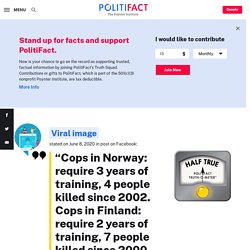
One post features an image with pictures of three smiling law enforcement officers above a photo of a fourth officer aiming an assault rifle. It suggests the three happy uniformed officers are from Norway, Finland, and Iceland, while the one who is aiming a weapon is from the U.S. The image explains differences in the amount of police training each nation requires compared with the numbers of people killed by law enforcement in each place: The policing of black Americans is racial harassment funded by the state. The rap group Public Enemy famously stated that “911 is a joke”.
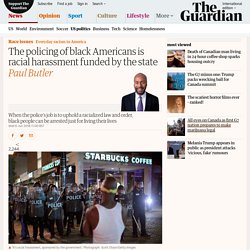
But that was in 1990. These days 911 is dead serious. Anyone in the United States can dial those three numbers and summon people with guns and handcuffs to participate in their anti-black paranoia. The forgotten murders of the Osage people for the oil beneath their land. David Grann’s true crime tale “Killers of the Flower Moon: The Osage Murders and the Birth of the FBI” is our second pick for the PBS NewsHour-New York Times book club, “Now Read This.”
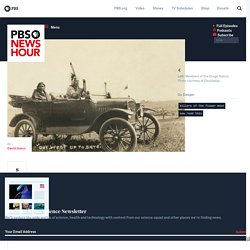
Become a member of the book club by joining our Facebook group, or by signing up for our newsletter. For an FAQ on how book club works, see here. Below, Grann recounts the history of the Osage Nation, and why they began to be mysteriously murdered off, in a photo essay. In the early 20th century, the members of the Osage Nation became the richest people per capita in the world, after oil was discovered under their reservation, in Northeast Oklahoma.
Then they began to be mysteriously murdered off. We don’t want billionaires’ charity. We want them to pay their taxes. “Charity is a cold, grey loveless thing.

If a rich man wants to help the poor, he should pay his taxes gladly, not dole out money at a whim.” It is a phrase commonly ascribed to Clement Attlee – the credit actually belongs to his biographer, Francis Beckett – but it elegantly sums up the case for progressive taxation. How the rich get richer – money in the world economy. How Native American Slaveholders Complicate the Trail of Tears Narrative. When you think of the Trail of Tears, you likely imagine a long procession of suffering Cherokee Indians forced westward by a villainous Andrew Jackson.
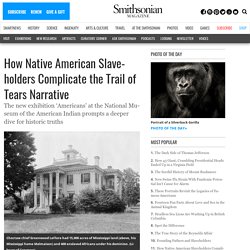
Perhaps you envision unscrupulous white slaveholders, whose interest in growing a plantation economy underlay the decision to expel the Cherokee, flooding in to take their place east of the Mississippi River. What you probably don’t picture are Cherokee slaveholders, foremost among them Cherokee chief John Ross. What you probably don’t picture are the numerous African-American slaves, Cherokee-owned, who made the brutal march themselves, or else were shipped en masse to what is now Oklahoma aboard cramped boats by their wealthy Indian masters.
These uncomfortable complications in the narrative were brought to the forefront at a recent event held at the National Museum of the American Indian. 'This is huge': black liberationist speaks out after her 40 years in prison. The first member of a group of black radicals known as the Move Nine who have been incarcerated, they insist unjustly, for almost 40 years for killing a Philadelphia police officer has been released from prison.
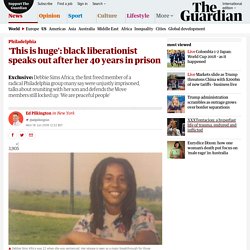
Debbie Sims Africa, 61, walked free from Cambridge Springs prison in Pennsylvania on Saturday, having been granted parole. She was 22 when with her co-defendants she was arrested and sentenced to 30 to 100 years for the shooting death of officer James Ramp during a police siege of the group’s communal home on 8 August 1978. US history explains that white fear of black people is just another tool to enforce racial segregation.
University students often keep late hours—so it’s unsurprising to see them asleep amidst books and papers in libraries and common rooms.

And yet, when a white Yale student saw Lolade Siyonbola, a black graduate student, had drifted off while writing a paper in their dorm’s common room, she assumed something was wrong—and called the police. The incident, which took place in the early morning hours of May 8, is one of several recent encounters to shine a spotlight on the daily realities of being black in a shared space. The Hidden Structure of U.S. Empire. The Root of All Cruelty? The philosopher David Livingstone Smith, commenting on this episode on social media, wondered whether its writer had read his book “Less Than Human: Why We Demean, Enslave, and Exterminate Others” (St. Martin’s). It’s a thoughtful and exhaustive exploration of human cruelty, and the episode perfectly captures its core idea: that acts such as genocide happen when one fails to appreciate the humanity of others. 'A torrent of ghastly revelations': what military service taught me about America.
My first and only war tour took place in Afghanistan in 2010. I was a US Marine lieutenant then, a signals intelligence officer tasked with leading a platoon-size element of 80 to 90 men, spread across an area of operations the size of my home state of Connecticut, in the interception and exploitation of enemy communications. That was the official job description, anyway. The year-long reality consisted of a tangle of rearguard management and frontline supervision. Years before Helmand province, Afghanistan, however, there was Twentynine Palms, California. From the summer of 2006 to the summer of 2007, I was trained as a lance corporal in my military occupational specialty of tactical data systems administration (a specialty I would later jettison after earning my officer commission in 2008).